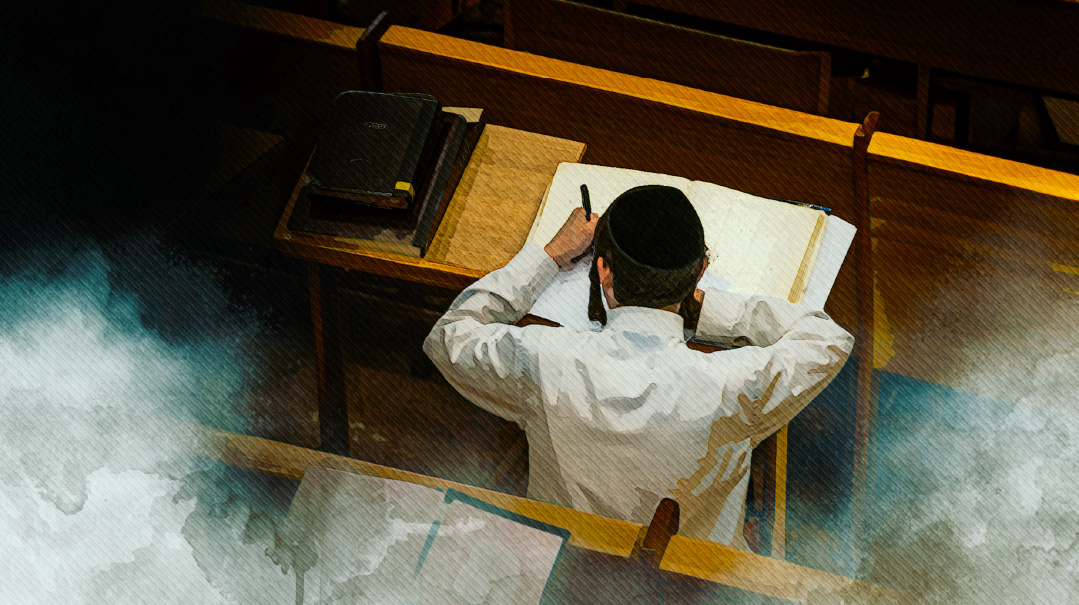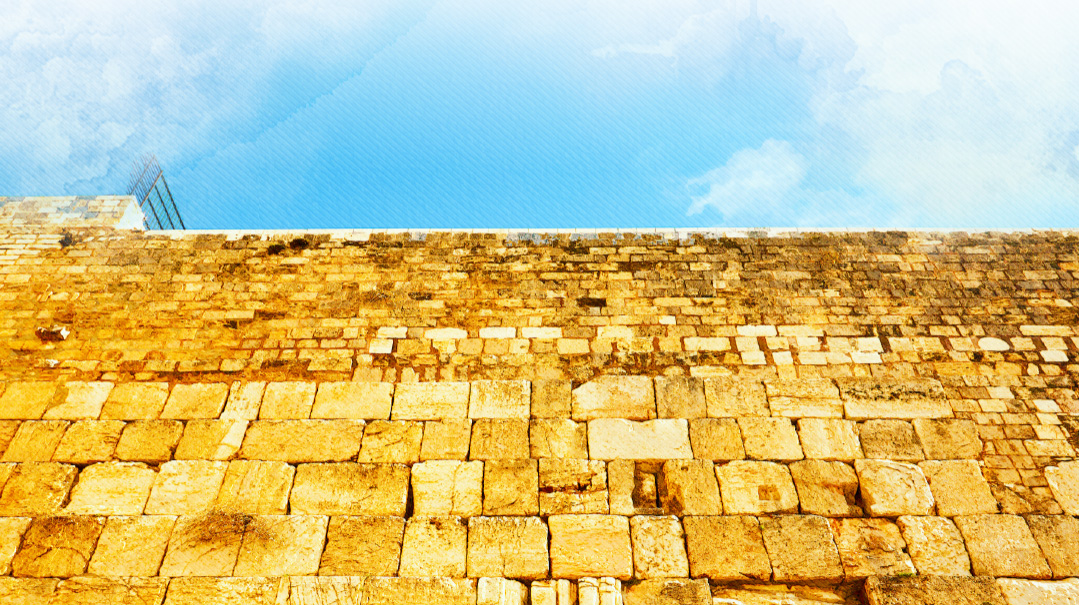Embrace New Beginnings: Letters for Elul Zeman

Letters of advice and uplift for the new Elul zeman

Coordinated by Shmuel Botnick
It’s the last month of the year, the bridge between past and future, a juncture for introspection on one hand, a time for fresh starts and a realigned level of spiritual connection on the other.
Throughout the yeshivah world and within our communities, Elul is a gift of unparalleled opportunity, a time to mend relationships, to leave unhealthy patterns behind, to begin anew with a clean slate and strengthened resolve. Whether you’re a bochur getting used to a new dorm, a teacher with renewed energy, a community rabbi with words of wisdom, or any hard-working Jew hoping for inspiration, everyone has a prayer — to utilize these awesome days with all their transformative potential.
A collection of letters between rebbi and talmid, principal and student, rabbi and kehillah — words of encouragement to maximize the opportunity for transformation, forgiveness, and renewal with a cleansed heart and soaring spirit

We’re in It Together
Rabbi Avrohom Weinrib
To My Dear Kehillah,
It’s hard to believe that the summer is almost over and Elul is here. One of the questions we often struggle with is: “Now what? It’s Elul and I want to work on something meaningful, but I’m not even sure where to begin.” In truth, all of us have our own individual personalities, strengths, and ambitions. However, at the same time, there is also an avodah of working together as a klal. While we are encouraged to undergo an individual process of growth, embarking on a communal initiative carries its own weight, importance, and, believe it or not, personal impact.
Last year, we chose to work on tefillah. As a kehillah, we instituted various programs and strategies that would help us in this critical area. The feedback we received was incredible. While we worked together, it was each person’s private Shemoneh Esreh that was transformed. It turns out that working together isn’t such a bad thing after all.
For this year, we chose the theme of “Seeking Out.” We often find the term “seeking” in relation to Elul, and this typically refers to our seeking out HaKadosh Baruch Hu. It’s an easy phrase to throw around, but what does it mean? How does one “seek out” HaKadosh Baruch Hu?
Perhaps it begins by seeking out oneself. Not the self you thought you knew, but the one you truly are.
As infants, we thought of no one other than ourselves. As we grow older and evolve from infanthood, we realize we don’t live in a vacuum; we are all part of a greater people, a greater calling, and a greater destiny. Our true self is the one that recognizes that it is only part of a very magnificent picture.
And so, here is what we are going to do: We are going to spend the next month thinking of others. Once every day, we are going to ask ourselves, “What can I do to help someone else?” The thing you choose to do can be very small. It can be a phone call to a friend who recently got a new job. “Hi,” you’ll say, “I just wanted to check in and see how the new job is going.” The conversation can last two minutes or less, but as the first man on the moon pointed out, what looks like a small step can actually be a giant leap.
That phone call drew you closer to yourself. It was a giant leap.
You know why that is? Because when you search for your true self, you’re searching for HaKadosh Baruch Hu as well. The closer you come in contact with your neshamah, the greater the bond will grow with He who imbued that neshamah inside of you.
Let’s do this. Let’s help each other. Let’s search out Hashem together. Let’s search out ourselves together.
And let’s all have a kesivah v’chasimah tovah. Together.
Rabbi Avrohom Weinrib is the rav of Congregation Zichron Eliezer in Cincinnati, Ohio and rabbinic administrator of Cincinnati Kosher.

Bring Your Open Heart
Rabbi Sender Kaszirer
Shalom, My Dear Talmid,
AS you’re about to begin the new zeman in a new yeshivah, I want to commend you on your stamina and brave decision.
Every now and then, you’ve encountered your old chaveirim, the ones you sat next to in class. And you silently wondered, “How did they do it? How did they glide through the mesivta years with such ease? How can they navigate the nisyonos of today’s teens without being affected?”
At the same time, you’re contemplating the new friends you made once leaving the halls of yeshivah. You may have had fun together but, when no one’s watching, you look at them and then you look at yourself and an unwanted question starts nagging at you: Is this really me? Is this what I want to be?
It’s a hard place to be in. You’re caught in the tug-of-war between a world of truth and a world of glamor, a world of altruism and meaning versus a world of selfishness and individualism.
You don’t want to play the identity game, you just want to be yourself. You want space, independence, and self-expression. You crave the ability to learn what your heart desires to learn, albeit unconventional; you strive to grow at your own pace and with your own style.
These aspirations made the mesivta experience hard for you. You couldn’t find your place and so you got up and left. But, much as the allure of the secular world appeared to grace you with the satisfaction you sought, you quickly realized it was all a fake. Yes, they offer the freedoms of self-pursuit, but those pursuits soon landed you in a dead-end. You quickly learned that beyond the veneer of glittering lights and glitzy ads are lost souls following empty promises and fruitless attempts to fill a void of holiness and destiny.
You knew this consciously but the heart was less convinced. It tugged in the other direction, trying to convince you to choose pleasure over meaning, convenience over fulfillment.
But you were courageous and you were bold. You followed your mind over your heart and here you are today, in our yeshivah where we accept you with open arms. Hashem’s Torah is big enough to fit all students; you must constantly remember what Chazal teach us: “Pischu li pesach k’chuda shel machat, va’ani eftach lach pesach k’pischo shel ulam.” All Hashem needs is a tiny opening, a small effort — and then leave the rest up to Him. Keep in mind that just like Moshe Rabbeinu taught Torah to all of Klal Yisrael, so too, there is a place in yeshivah for every single boy who wants to learn. Regardless of your past history, outward appearance, or level of learning, it is the ratzon that counts. Just bring a little bit of ratzon and an open heart and you are graciously accepted into the olam hayeshivah.
B’ahavah, Your Rebbi
Rabbi Sender Kaszirer is Rosh Yeshivah of Mesivta of Eatontown, New Jersey.

The Real You
Rabbi Avrohom Neuberger
Dear Talmid,
Here’s a little secret: At times, the yeshivah’s agenda and your agenda are at odds. For a school or yeshivah or beis medrash to function optimally, it must lean towards conformity, whereas for you to blossom fully, to bring out your own kochos hanefesh, you must lean toward originality and individuality. Let me explain with a history lesson.
The Gemara (Bava Basra 21a) teaches that if not for Yehoshua ben Gamla, “Torah would have been forgotten from the Jewish People.” Initially, each father taught his own son Torah, in accordance with the mitzvah, “v’limadetem osam es beneichem — Teach [the laws of the Torah] to your sons” (Devarim 1:19). However, orphans who did not have fathers, or those children whose father could not, or would not, learn with them, remained uneducated. The Gemara records a series of takanos that were meant to address the issue, but the matter remained unresolved until Yehoshua ben Gamla came along and established a system in which rebbeim would be placed “in each and every province and in each and every town,” to educate the students from age six or seven and on.
In other words, ideally the Torah was meant to be transmitted from father to son, in a one-on-one educational system that clearly would be tailored to each child’s acumen, progress and inclination. This was the ideal — but it was not sustainable, so a yeshivah system was established. That system demanded classes, rebbeim learning with multiple students at one time, and of course, conformity. Because the only way a rebbi can teach is by disciplining his class, holding everyone in line, so that they all “shtell tzu” to one schedule and one lesson. Sure, that schedule and those lessons are geared to reach the greatest number of students, but they cannot be tailored to each student’s particular needs.
Yet for you, dear talmid, as the student, is that conformity catering to your individual needs?
(Before continuing, let me “pump the brakes” and qualify what I am saying. It goes without saying that younger bochurim should completely shtell tzu to the system that they are in. In most cases they are hardly knowledgeable enough to have an opinion as to what does talk to them and what does not. The average 15-year-old is insufficiently sophisticated in learning nor mature enough in thought to have a seat at the table even as to what is best for him [though he, too, can turn to his rebbi to help him discover his calling]. I am addressing an older bochur, who has reached some degree of sophistication and maturity, encouraging him to listen to his inner voice.)
In terms of hashkafah, a yeshivah has every right, and every duty, to present its shitah to its talmidim — provided that it reflects the shitah of the preponderance of constituents. For example, most families sending their children to a Satmar yeshivah want their children taught the Satmar shitah about Eretz Yisrael. If the yeshivah fails to present it, or even acknowledges other viewpoints as valid, it is doing a disservice to its constituents. When parents choose Satmar, they know what they’re getting; if they don’t like it, they shouldn’t send there. But let’s say a bochur from a Gerrer or Belzer family somehow finds himself attending that yeshivah, and the shitah does not resonate with him because his family’s chassidus has a different viewpoint about the topic. Does he not have the right, or perhaps even the duty, to explore further his family’s viewpoint? Is the yeshivah doing something wrong? Not at all. Is he doing something wrong? Not at all.
Let’s talk derech halimud. Your yeshivah follows the derech that is in vogue in the US — slow lomdishe learning that seeks to clarify the underlying yesod of the sugya. It clearly works for many people, and many find great satisfaction in that approach to learning. You, however, do not enjoy it. You enjoy instead covering ground, becoming knowledgeable in wider swaths of the Gemara and halachah. Are you not doing a disservice to yourself by simply shtelling tzu? After all, the Chovos Halevavos (Shaar Bitachon, end of ch. 3) advises:
“Every man has a desire for one type of work or business more than any other. Hashem planted in each man’s nature a love and passion for that field just as He did with all living things (who naturally are drawn to what is best for them). In this way, people will find that their nature and bodies are naturally inclined for this business or for that melachah. One who finds in his character and nature a longing for one melachah above all the others… should turn to it and choose it as the source (‘sibah’) for his income.”
If this is true regarding parnassah, is it not certainly true regarding derech halimud?
But even more, I think by simply shtelling tzu you are doing a disservice to Klal Yisrael. Let me explain with a short vort.
In the secular world the second book of the Torah is called “Exodus,” although it really should be referred to as “Names,” which is the literal translation of Shemos. Perhaps whoever named the Chumashim preferred the dramatic ring of “Exodus” over the pedestrian sounding “Names.” But what then was he thinking when he came to Bamidbar? Instead of referring to it by the definition of “Bamidbar,” the stirring “Wilderness,” he chose instead the boring “Numbers” (although Chazal also refer to it as Sefer Hapekudim — the Book of Countings). In any case, let’s discuss these two terms, Names and Numbers. Indeed, we find the phrase “b’mispar shemosam” — the number of their names — mentioned repeatedly at the beginning of Bamidbar. This is an odd phrase. One who is asked to count the number of people in a room will count how many people are present, not how many names there are. What is the meaning of the phrase, “the number of their names”?
Number and names are in fact opposing concepts. Numbers unite; names divide. Numbers emphasize conformity; names highlight individuality. That is, when one counts numerous items, he necessarily focuses on their common traits, not what sets them apart. For instance, one has before him several varieties of fruit. If he wishes to know the total, he focuses on the fact that they are all fruit. Were he to look at their individual traits, this one being an apple and that one being an orange, they could not be combined to one aggregate sum. Like the adage goes, “You can’t count apples and oranges.” A more extreme — and horrible — example is the dehumanizing numbering of the concentration camp victims. They were reduced to nothing more than a number, without any individuality.
Names, on the other hand, are used to identify things and thus emphasize an object’s distinctive features. For example: Two objects made of wood, say a chair and table, are referred to not as wood, but rather as a table and chair. Similarly, a family name is created to distinguish between one family and the next. First names are used to highlight the individuals within a family. A name is about uniqueness.
The beauty of counting is in the fact that it is a unifying force. Hashem counts us so that we should coalesce and become part of one large sum. But the danger in counting is that it robs one of his or her individuality. You are just a number. So Hashem counts us by name to stress the value of each individual Jew. He wants a unity made up of different parts, a “mispar shemosam.” We are all here for our individual missions. Each and every one is special and unique.
So, dear talmid, if your heart pulls you toward mussar, toward bekius, halachah, toward even more iyun, hashkafah, chassiddus, whatever it may be, follow your passion. This in no way means that you should break away from where you are. Chas v’shalom. I’m not asking you to rebel against the system. But I am begging you to find that area of Yiddishkeit that really talks to you and to make it truly yours. You can do this wherever you may find yourself… if you really care.
Klal Yisrael really needs you… but the really authentic You.
Forever Yours, Rebbi
Rabbi Avrohom Neuberger is the rav of Congregation Shaarei Tefillah of New Hempstead, New York and the author of Positive Vision and the recently published Sefer Chofetz Chaim (elucidated), a Chofetz Chaim Heritage Foundation project (ArtScroll/Mesorah). For many years, he served as a shoel u’meishiv and taught first-year beis medrash in several yeshivos gedolah.

Time for a Reset
Rabbi Yehuda Oppenheimer
Talmidos Chashuvos,
I hope you and yours are well and that this letter finds you enjoying some summer relaxation.
Just two weeks ago in shul, we once again heard those consequential words: “Rosh Chodesh Elul yihiye….”
However, while all shul-goers heard the identical words, our emotional response to them was likely varied. Some of us may have become anxious about all the work that will need to be done to prepare for the upcoming Yamim Tovim, while others might have been saddened by the implication that the end of summer is in sight. Some may be dreading the beginning of a new school year, while the trepidation of others might stem from the approaching yemei hadin.
Although all these reactions, to varying degrees, may be reasonable and warranted, there is another feeling and realization that ought to be foremost in our hearts and minds when hearing and considering this proclamation: Opportunity knocks! Chodesh Elul brings with it the extreme happiness of knowing that once again Hashem’s Hand will be outstretched, encouraging and supporting our return to His loving embrace.
When contacting customer support to try and get help with a phone that is not working properly, one is usually given a list of methods to try first, after which he is told that he can do a master reset, which is sure to fix the problem. The reason this “trick” is suggested only when nothing else works is because performing a master reset means that one will lose all the personal preferences that he programmed into his phone. While this is understandably an inconvenience that one will try to avoid, perhaps it actually reveals something important: It was one of those personal preferences that messed up the phone!
We left Neilah last Yom Kippur feeling cleansed. We were incredibly grateful to the Ribbono shel Olam for mercifully accepting our teshuvah and we were confident that this year would be better. Hopefully it was! But along the way we developed “personal preferences” and now we sense that, because of them, our neshamos are not in perfect working order. But unlike a phone, there are no shortcuts or quick fixes to try first; thankfully, we are once again given the opportunity to perform a reset.
This ability to fix something we broke should not be taken for granted. Most things we carelessly ruin are gone forever. Indeed, the gift of teshuvah is considered by Chazal to be one of Hashem’s greatest gifts to mankind. But, as the Orchos Tzaddikim tells us, to be able to do it we must believe that it works. Comparing it to a bitter pill that one is given as a cure for a physical illness, one will only be willing to swallow the pill if he believes that it will cure him. So too, one will only be willing to undergo the teshuvah process if “yeida be’emes shehateshuvah refuah sheleimah la’aveiros — he truly knows that teshuvah is a complete healing for aveiros.”
It is understandable that we may be a bit apprehensive when the month of Elul arrives. Giving up our “personal preferences” — those enjoyable habits that have become so much a part of our lives — requires hard work. But let us “keep our eyes on the prize.” Let us remember that the grueling process of detaching ourselves from these habits will allow us to leave Neilah once again feeling cleansed and spiritually refreshed. Our neshamos will be good as new, in perfect working order. We will be spotless, polished, and shining, back again in Hashem’s loving embrace. How fortunate we are to have this opportunity!
Best wishes for a kesivah v’chasimah tovah,
Rabbi Y. Oppenheimer
Rabbi Yehuda Oppenheimer is the menahel of Bnos Beis Yaakov of Toronto, Canada.

Dream On
Rabbi Tzvi Mordechai Feldheim
Dearest Talmidim,
It’s Elul, a time that conjures up many mixed feelings. This will be the zeman to shteig, connect, discover a cheshek and feel a dveykus. It’s a zeman filled with the tension of the upcoming Yamim Noraim, yet also with the exhilaration of the tefillos and the purity of teshuvah. A time of vast potential and deep hopes. There will be moments of sublime joy and then perhaps moments of disappointment, and moments that promise growth. You might be dealing with myriad emotions, fears, hopes, longings, and insecurities. So, grab your rebbi and talk to him. He needs to know your longings and your dreams, your fears and your aspirations. He needs to know that you will be his talmid and then he will be your rebbi. Let him hold your hand and walk with you until you learn to walk on your own, holding onto the hand of HaKadosh Baruch Hu. This is not a time to be cool, distant, cynical or apathetic. This is a magical zeman. It’s a zeman that will remake you if you truly want it and inspire you if you open your heart.
I remember an Elul many years ago. I was a bochur and it was time to return to yeshivah. I felt unworthy. It had not been a good summer for me. I sorely needed chizuk, so I went to Rav Shimon Schwab ztz”l and shared my feelings of unworthiness. The Rav asked me to recall the Shemoneh Esreh of Rosh Hashanah. “V’chen tein Pachdecha — cast Your fear upon mankind… may evil be removed and may the nations unite to serve Hashem.” Who davens such a tefillah, he asked me? He didn’t wait for my answer. He looked at me and said, “This is the tefillah of a tzaddik, and on Rosh Hashanah you are a tzaddik.” I seemed skeptical — a tzaddik, you say? Me, a tzaddik?
As if reading my mind, he asked me another question. Every night at Maariv, we say “V’haser satan mil’faneinu ume’achareinu — Remove the Satan from in front of us and behind us.” You know the Satan in front of you, but who is the Satan in the back? Again, the Rav didn’t wait for my response, and he said, “That Satan is the cynic.” This is the one who reminds you of your shortcomings and doesn’t let you believe in your potential. Elul is the time of Ani l’dodi v’dodi li. We can tell Hashem what we want and Hashem will tell us, “Yes you can.”
This is the magic of Elul and the Yamim Noraim. My dearest talmidim, open your hearts and dream of gadlus. Dream of shteiging and siyumim, of kushiyos and terutzim, of chaburos and chiddushim. Dream of a kesher with HaKadosh Baruch Hu and dream of Mashiach and the Beis Hamikdash and then live your dreams.
So go ahead, open that new Gemara to daf beis and begin like never before. It’s a time for positivity, excitement and enthusiasm, and it’s a time to dream. Kesivah v’chasimah tovah.
Love, Rebbi
Rabbi Tzvi Mordechai Feldheim is Rosh Mesivta of Yeshivas Kesser Torah of Baltimore, Maryland.
(Originally featured in Mishpacha, Issue 975)
Oops! We could not locate your form.

